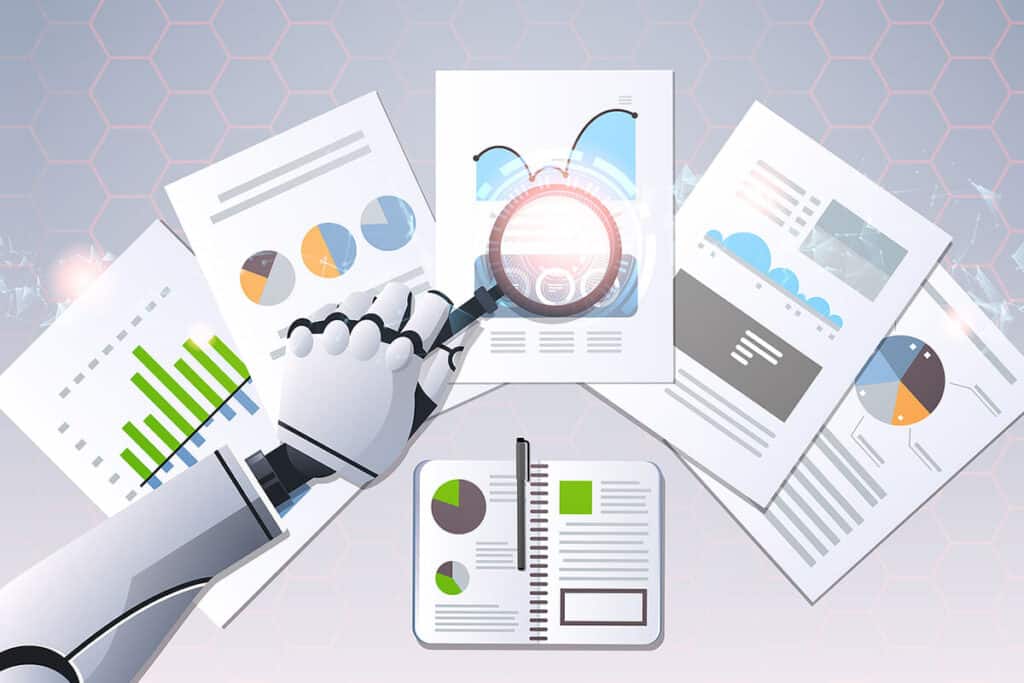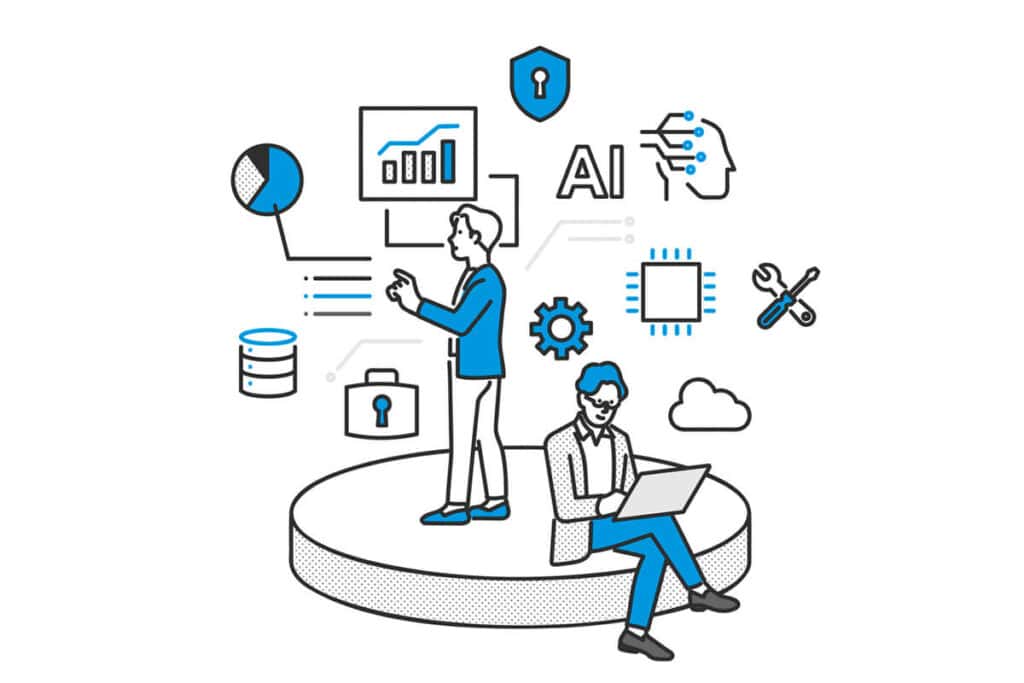Key Highlights
- Artificial intelligence (AI) in management helps businesses automate and optimize key functions and tasks, boost employee productivity, drive business value, and increase competitive agility.
- AI enables managers to strengthen data analysis, accelerate decision-making, improve customer experiences, and optimize IT operations, sales, marketing, and cybersecurity practices.
- Specific management applications that benefit from AI include decision support, data analysis, project management, and strategic planning.
- Challenges to AI adoption among managers include data dependency, AI ethics, and the importance of human oversight.
- As AI technologies continue to evolve, AI tools for management are gaining and expanding powerful abilities such as predictive analytics. Managers should follow relevant trends closely to be prepared to take maximum advantage of new solutions and features as they become available.
Table of Contents
ToggleBusinesses of all sizes and types are harnessing the power of Artificial Intelligence in management to gain significant competitive advantages. Organizations are using AI to optimize business functions, boost employee productivity, make customers happier and more loyal, and drive value across the board.
All of this is changing how managers manage as well. One of the key benefits of Artificial Intelligence in management is its ability to strengthen data analysis and decision-making processes. With AI-powered tools and algorithms, businesses can make data-driven decisions that are more accurate and efficient. AI can analyze large volumes of data rapidly, identify patterns and trends, and provide valuable insights that can inform strategic initiatives and drive business success.
Operational efficiency is another area where AI shines in management. By automating repetitive tasks and streamlining workflows, AI technology can greatly improve operational efficiency, allowing managers and their teams to focus on more strategic tasks and projects. This ultimately leads to increased productivity, job satisfaction, retention of expensive, hard-to-replace people, and cost savings for the organization.
Strategic initiatives are greatly enhanced by the use of Artificial Intelligence in management. With AI-powered predictive analytics, managers can anticipate future trends and outcomes, make more rapid and proactive decisions, and stay ahead of the competition. AI can also assist in strategic planning by providing valuable insights and analysis that can inform business models and drive growth.
Introduction
Artificial intelligence (AI) has quickly become a transformative tool for many businesses. From improving decision-making to enhancing operational efficiency, AI can potentially change the game for businesses of all sizes — and is already doing so for a growing number of them. This article explores the impact of AI in management, the applications of AI in various management functions, the challenges of AI adoption, and the future trends you should watch. By understanding the potential of AI in management, your business can harness its power to gain a competitive edge, drive innovation, and achieve long-term success.

The Impact of Artificial Intelligence in Management
Artificial intelligence (AI) is helping business leaders make better, faster decisions and improve how their businesses do business. AI technologies such as machine learning and data analysis enable decision-makers to improve their decision-making processes, optimize their management strategies, and streamline their overall business operations. AI provides valuable insights and analysis that can inform strategic initiatives, drive innovation, and help businesses achieve and maintain that all-important competitive edge.
One of the key elements of AI in business management is natural language processing (NLP). The ability to request, search for, and retrieve information from business documents and databases in plain language eases and speeds interactions between people and business systems. NLP also helps improve interactions with chatbots and other virtual assistants.

Does AI Improve Decision-Making?
AI has proven to be a valuable tool in improving decision-making processes. Machine learning (ML) algorithms and deep data analysis abilities enable AI to provide business decision-makers with valuable insights and predictions. AI can analyze vast amounts of data and identify patterns and trends that humans may be unable to detect. This enables businesses to make more informed decisions and take advantage of previously overlooked opportunities. AI-powered decision-making can also help decision-makers mitigate risks and anticipate future challenges. AI can help you and your colleagues make smarter, faster, more data-driven decisions that lead to better outcomes and competitive advantage.

Improve Operational Efficiency Through AI
AI technologies can improve operational efficiency significantly by automating repetitive tasks and streamlining workflows. AI-powered tools can liberate decision-makers and workers from repetitive, mundane tasks, allowing them to focus on more strategic and value-added activities. AI can automate routine tasks such as data entry, data analysis, and first-level customer support, increasing employee productivity and improving request response times and customer satisfaction. Additionally, AI can provide real-time insights and recommendations that help managers optimize their operations. AI can help your business increase efficiency and agility, reduce costs, and improve overall performance.
Exploring AI Applications in Management
AI has a wide range of applications in management, from data analysis to project management and strategic planning. AI can analyze large datasets and extract meaningful insights that inform business strategies and decision-making. AI tools can streamline workflows, automate tasks, and improve collaboration among team members for better project management. AI can provide valuable insights and analysis that improve business models and forecasts and drive growth. AI-powered management applications can help you optimize the allocation of human and other resources, streamline critical functions and operations, and unlock new opportunities for your business.

Data Analysis and AI
With the advent of big data, businesses have access to vast amounts of customer data. That data can provide valuable insights and drive informed decision-making. It can also be difficult to navigate and analyze.
AI-powered data analytics can analyze large volumes of data quickly and efficiently. AI technologies and algorithms can identify patterns, trends, and correlations that may not be apparent to human analysts. Business decision-makers can make data-driven decisions based on deeper, broader, analyses and real-time insights. AI can also automate elements of the data analysis process, such as inspecting data for format errors or other common anomalies. This can improve data quality and extract valuable information from large datasets faster and more efficiently.

Transform Project Management with AI
Project management is a complex, demanding, high-value task. Every project includes elements of risk, some with the potential to disrupt business operations indefinitely. AI tools can help to streamline and optimize project management tasks and processes and enable project managers and teams to avoid and mitigate project-related risks.
AI-powered project management tools can automate routine administrative tasks, such as scheduling, budgeting, and resource allocation. This can free up project managers to focus on more strategic aspects of their work. Automation also brings consistency to repetitive, mundane tasks, eliminating the risk of human error.
These tools can also provide real-time insights and recommendations that can help project managers and teams identify potential bottlenecks and optimize project timelines. AI technologies combine with the experience and expertise of project management team members to eliminate and mitigate project risks.
AI-powered project management can help your business improve efficiency, reduce costs, and ensure more consistently successful project delivery. AI can enable better collaboration for project management teams and stakeholders, improve decision-making for your project managers, and drive overall project success.

Strategic Planning in the Age of AI
The effectiveness of its strategic planning at your business can directly affect its short- and long-term future. Its criticality to your business can hardly be overstated. AI technology can provide valuable insights and analyses that inform strategic initiatives and drive innovation.
AI-powered tools and algorithms can analyze market trends, customer behavior, and industry dynamics to help your business decision-makers identify new opportunities and develop effective business models. AI can also help decision-makers anticipate future challenges and risks and adapt with agility to changing market conditions. AI tools can help your business leaders be more competitive, drive sustained growth, and achieve long-term success.

How To Manage the Challenges of AI Adoption?
It would be disingenuous at best to presume your business can implement any significant AI deployment without any resistance. Contributors to that resistance can range from a lack of understanding of the goal or the process of the planned implementation to alarmist warnings of AI taking jobs from humans.
The best way to deal with resistance to AI adoption is to do all you can to minimize it as early as possible m the adoption process. And as uncomfortable or unfamiliar as it may be to you or some of your colleagues, some “sales and marketing” will be required.
Where possible, encourage stakeholders in your planned AI deployment to read about how AI is being used by other companies like yours. Your chosen AI vendor or integration partner may be able to recommend online sources of information as well. Once your project is approved, identify all affected stakeholders as early as possible, and communicate with them directly and transparently throughout the project’s evolution. Make sure to acknowledge and address any concerns raised by your stakeholders, privately or with others as the stakeholders deem appropriate.
Once the deployment is complete, assess its effectiveness and share your results. Even if you achieve less than you had hoped or planned, you and your colleagues will have established yourselves as trustworthy and reliable. Use your project experience to help develop, refine, and enforce robust change management, data governance, and transparency policies and processes. This will help you to establish a culture of innovation within your organization, a culture in which objections and resistance to AI deployments and other developments will be acknowledged and addressed effectively for all.

Dealing with the Complexities of Data Dependency
Data drives every important business decision. Data dependency is a given, and navigating the complexities of data dependency in the realm of artificial intelligence in management requires a strategic approach.
Organizations must establish robust data governance frameworks to ensure the accuracy and relevance of the data utilized by AI systems. It is crucial to address data quality issues, such as incompleteness or inconsistency, to prevent skewed outcomes. Moreover, incorporating data validation processes and regular audits can help maintain data integrity and reliability.
By prioritizing data quality and security measures and compliance with data protection regulations, your businesses can mitigate the risks associated with data dependency in AI applications. AI-powered tools can help with establishing and sustaining effective data governance policies and practices. Embracing a proactive stance towards data management is paramount for leveraging the full potential of AI technologies.
The Importance of Human Oversight in AI Ethics
Transparent, effective human oversight is vital to ensure the responsible and ethical deployment of artificial intelligence in management. While AI systems can analyze vast amounts of data and perform tasks efficiently, humans must make ethical decisions. Humans bring a sense of empathy and moral judgment that AI lacks, especially when dealing with complex ethical dilemmas.
It is imperative for organizations to establish clear guidelines and ethical frameworks, with human intelligence guiding the ethical considerations of AI technology. By incorporating human oversight, businesses can uphold ethical standards and mitigate potential risks associated with AI implementation.
AI Trends to Watch
Two top trends for AI in management are the growth of predictive analytics and the evolution of AI technologies. Predictive analytics enables increasingly proactive decision-making and data-driven forecasting, abilities that are essential for maximum competitive agility. And as AI technologies evolve, they gain more power and flexibility to apply to multiple management tasks and strategic business initiatives.
Predictive Analytics and AI
Predictive analytics, a crucial component of artificial intelligence, enables more powerful decision-making by forecasting future outcomes based on historical data patterns. AI’s predictive capabilities empower businesses to anticipate trends, optimize strategies, and mitigate risks proactively. By leveraging machine learning algorithms and data analysis techniques, your business can unlock valuable insights to drive informed actions and stay ahead of the competition.
Predictive analytics enhances resource allocation, improves operational efficiency, and boosts overall business performance. With AI’s ability to process vast amounts of data into actionable information, predictive analytics becomes an indispensable tool for navigating complex business landscapes. Harnessing the power of AI with predictive analytics can enable the strategic planning and foresight that creates sustainable growth and success for your business.

The Shifting Landscape of AI Technologies
The rapid evolution of artificial intelligence technologies continues to reshape industries and redefine how businesses operate. From advancements in machine learning to the integration of deep learning algorithms and the development of ever-more-powerful computing hardware, AI technologies are constantly, rapidly evolving.
You and your colleagues need to do all you can to keep tabs on these technological shifts Understanding the latest trends and developments in AI is crucial for senior leaders to make informed decisions about how best to take advantage of AI, in management and beyond.
Conclusion
AI is enhancing decision-making processes and boosting operational efficiency for all types of businesses. Its applications in data analysis, project management, and strategic planning are reshaping traditional approaches. However, challenges such as data dependency complexities and ethical considerations must be addressed for successful AI adoption.
You and your colleagues should get and stay informed about Artificial Intelligence in management and the evolution of AI technologies and their ethical implications. This will help you to navigate the future of AI-enabled management effectively, for your business and your career.

Frequently Asked Questions
How Can Managers Start Integrating AI into Their Strategies?
Managers can start integrating AI into their strategies by first identifying the areas of their business that can benefit from AI technology. This could include optimizing operational processes, improving decision-making, or enhancing customer experiences. Once the areas of focus are determined, managers can explore AI solutions that align with their business goals and objectives. It is important to choose AI tools that are compatible with existing systems and can seamlessly integrate into the workflow. Managers should also involve relevant stakeholders and employees in the AI integration process to ensure smooth implementation and adoption. By leveraging AI technology strategically, managers can gain a competitive edge, improve operational efficiency, and make data-driven decisions for the success of their business.
What Are the Top Ethical Considerations for Artificial Intelligence in Management?
When incorporating AI into management practices, it is crucial for managers to consider the ethical implications. One of the key ethical considerations is the need for human oversight in AI systems. While AI can automate certain tasks and provide valuable insights, human judgment is still necessary to ensure responsible decision-making and address potential biases in AI algorithms.
Data privacy is another important ethical consideration, as AI relies on vast amounts of data. Managers must prioritize data protection and ensure compliance with relevant regulations to maintain customer trust.
Additionally, managers should be aware of the potential risks associated with AI, such as unintended consequences, unaddressed biases, or job displacement. Solid ethical guidelines and regular review of your AI systems can help mitigate these risks and ensure responsible AI implementation in management practices at your business.
Can AI Completely Replace Human Decision-Making?
AI can enhance decision-making processes, but it cannot completely replace human decision-making. AI systems can analyze large amounts of data, identify patterns, and provide insights to support human decision-making. However, human judgment, creativity, and emotional intelligence are still critical for making complex and strategic decisions. AI cannot yet fully understand context or handle unexpected situations, and may never do so at a human level. The best business management decisions will be made by humans assisted by AI for the foreseeable future.






